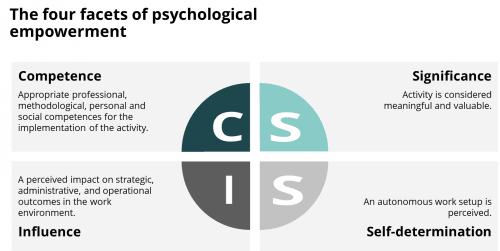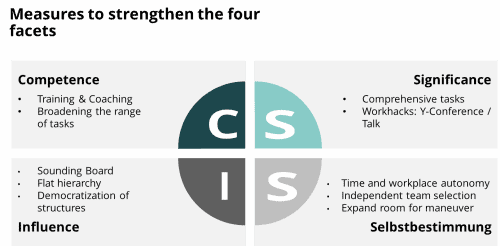28.02.2022
We are already in the middle of the New Work era. The problem with New Work is that the focus is usually on structural measures. For example, working hours are quickly cut and hierarchical levels removed. Not too seldom, however, this does not have the desired effect and leads to identity problems, politicisation and complexity problems instead of motivation and increased performance.
What is missing here? The view from within.
Surprisingly, our research is quite a bit ahead of our economy here. As early as 1949, Harry Harlow experimented with laboratory monkeys on this topic. In the experiment, the monkeys were asked to solve a motor task (see illustration).

Source: Pink, D. H. (2015): Drive: The Surprising Truth About What Motivates Us, Riverhead Books, New York.
At that time (and to some extent still today), the idea was: what drives us are either (1) our biological urges or (2) carrots and sticks. In other words, rewards and punishment. Things got interesting when the monkeys showed interest in the task even before the experiment started. And not only interest… they solved the task without any incentives.
This gave rise to a new theory: there is a third drive. A drive from within. Triggered by doing and trying the thing itself. Later, it was realised that people also have this drive, called intrinsic motivation: people want to expand their abilities on their own.
Great. Is it possible to activate this intrinsic motivation in our employees? One way to do this is through psychological empowerment. That is, empowerment needs a psychological component.
Intrinsic motivation through psychological empowerment
The term “empowerment”, referring to the empowerment of employees – mostly in the course of democratisation in the company – is unfortunately often quickly pushed aside as a buzzword. What has been problematic in implementation so far is that in the context of empowerment only the structural component (e.g. the removal of hierarchical levels) has been considered.
However, in recent years we have learned from Gretchen Spreitzer and extensive research based on her findings: people interpret their environment individually. That is, removing one level of hierarchy has a liberating effect on one person, while others lose an important point of orientation as a result. A broader view, the interpretation on a psychological level, is essential here to enable the empowerment of employees. In this context, there are four work-related perceptions that shape our role and thus the shaping of our possibilities for psychological empowerment:

Source: The Company Journey Guides GmbH
People who feel psychologically empowered experience their work as meaningful (significance). They feel confident in their work tasks (competence). They perceive autonomy (self-determination) and are convinced that their work can make a difference (influence).
Here, the perception of psychological empowerment is based on a high expression of each facet. If one facet is low, the construct loses stability.
Why we should engage more with psychological empowerment
The concept of psychological empowerment has already been examined in numerous studies and research papers. What is particularly exciting is that there are numerous correlations with benefits for employees but also for the organisation as a whole.
On the employee side:
- Increased employee satisfaction
- more flow experience (the state in which we are completely absorbed in our work)
- less stress
- less tendency to depression
On the organisation side:
- Increased Organizational Citizenship Behavior (OCB), the voluntary commitment to work.
- Increased extra-productive behaviour (behaviour beyond what is contractually regulated, e.g. helpfulness)
- Promotion of innovation
- Stronger affective commitment to the company
- Lower employee fluctuation
For most companies today, the main focus is on generally increased performance. This can sometimes be explained by the fact that the trust gained through self-determination and influence is repaid through conscientious and uncomplicated behaviour.
Utilising the psychological component of empowerment in the right way
Especially in today’s world, it is important to understand that control from the outside is neither manageable nor desirable in many areas. Psychological empowerment relies on the view from within. It gives us a chance to sustainably inspire our employees by activating their intrinsic motivation.
In the course of redesigning one’s own work, it is therefore well worth considering setting psychological empowerment as a target. Those who would like to use psychological empowerment for themselves must bear in mind that there is no universally valid special recipe for this. As explained at the beginning, the concept is based on the individual perception of each employee. Therefore, it is first necessary to recognise and understand the point of view and needs of one’s own employees.
The same also applies to the manager. Why not start with a small personal experiment? Ask yourself these two questions every day after work and take 5 minutes to reflect.
Which work situation has made you feel empowered?
In which situations have you experienced less empowerment?
Once it becomes clear what is lacking, there are a wide variety of human resource development measures that can strengthen the perceived psychological empowerment across the individual facets, such as:

Source: The Company Journey Guides GmbH
And it is clear – empowerment needs a psychological component.
We are looking forward to hearing about your experiences. You can also find more on this topic in our Learning Nugget New Work in a nutshell.
This blog was written by Leoni Meffle.
